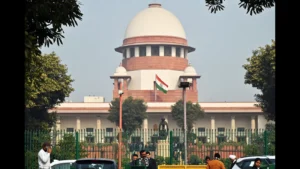GS2 – Polity

Context
In a landmark suo motu action, the Supreme Court of India initiated proceedings against five social media influencers for allegedly mocking persons with disabilities (PwDs). This case has reignited the critical debate over reconciling Article 19 (freedom of speech) with Article 21 (right to life and dignity), especially in the age of unregulated digital platforms and influencer-led content.
Key Supreme Court Observations:
- Primacy of Dignity over Free Speech:
The Court underscored that in instances of conflict, Article 21 (dignity) must take precedence over Article 19(1)(a) (freedom of speech), reaffirming dignity as the foundation of constitutional morality. - Moral Boundaries of Expression:
It labelled the comedians’ acts as “damaging and demoralising,” stressing that free speech cannot be a defence for content that demeans or humiliates others, particularly vulnerable groups. - Regulatory Guidelines Needed:
The Court instructed Attorney General R. Venkataramani to draft comprehensive digital content regulations, ensuring a balanced framework between creative expression and constitutional values. - Consultative and Inclusive Process:
Emphasising stakeholder participation, the Court called for broad-based consultations to frame guidelines that are future-ready, respectful of both individual dignity and democratic freedoms.
Broader Implications:
- Regulatory Vacuum in Digital Media:
The case reveals the urgent need for structured governance of digital platforms, especially in an environment of increasing hate speech, offensive content, and algorithmic sensationalism. - Influencer Accountability:
By requiring the personal appearance of influencers, the Court has asserted the need for greater legal and ethical responsibility in the influencer ecosystem. - Rights of Persons with Disabilities (PwDs):
Mocking PwDs not only deepens social marginalisation but also violates the mandate of the Rights of Persons with Disabilities Act, 2016, which advocates inclusive and respectful representation. - Judicial Evolution in Digital Era:
The ruling sets a precedent for shaping ethical standards in online discourse, reinforcing the judiciary’s proactive role in protecting digital dignity and upholding constitutional morality.
Way Forward:
- Digital Ethics Literacy:
Promote constitutional values and sensitivity through public campaigns and educational curricula, with a focus on influencers and youth. - Independent Content Oversight:
Encourage digital platforms to adopt third-party review mechanisms and enhance community standards for content moderation. - Balanced Judicial Oversight:
Ensure that regulatory measures protect against hate speech and online abuse without sliding into excessive censorship.




